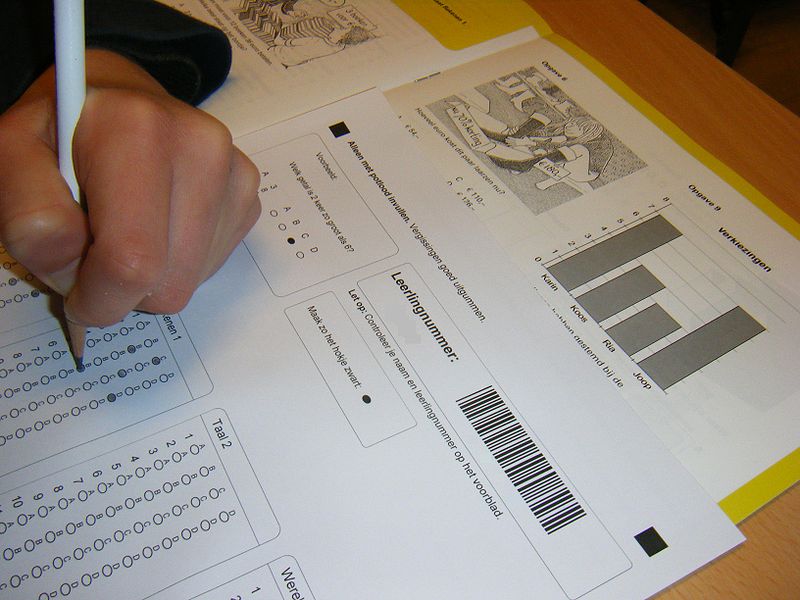
In the spring of 2013, children around the nation sat down at their desks to take standardized tests — assessments that carry high stakes and wide-ranging implications for school funding and policies.
In an almost unprecedented exception, however, elementary and middle school students in Newtown, Conn. did not take their Connecticut Mastery Tests that March. In the wake of an unimaginable tragedy — the shooting on December 14, 2012 of 20 students and six school staff members at Sandy Hook Elementary School — the district received permission not to administer the test.
Meeting on Tuesday, January 23, 2013, just five weeks after the horrific event, the Newtown Board of Education held a meeting with the addition of a special agenda item to discuss the waiver. According to the board's minutes, board members cited student stress in the wake of the events as the primary reason to request a waiver.
Not everyone supported this exemption; some board members also raised apprehensions about it. Concerned that cancelling the tests would make it more difficult for Newtown schools to return to normal, board member Kevin Alexander suggested that returning to students' regular routines would help with the healing process. William Hart worried about a decline in academic rigor. Other board members cited concerns about the variety of policies that depend on test results, such as funding decisions and teacher evaluations.
The waiver debate was about "whether to maintain consistency following the tragedy or make an adjustment because of its unique circumstances," said Tom Kuroski, president of the Newtown Federation of Teachers and an anatomy and physiology teacher at Newtown High School.
After significant deliberation — the meeting would ultimately adjourn at 1:10 a.m. — the board voted 5-2 in favor of requesting a waiver.
A Rare Exception
The waiver that the Newtown schools applied for and eventually received is virtually unheard of in the modern era of high-stakes testing and accountability in education.
"This isn't something that happens every day," said Steve Martin, coordinator of the Connecticut Mastery Test for the Connecticut Department of Education. In fact, Martin said, the process was unique — this is the only time he has seen a waiver like this granted, and he does not know of any other waiver requests that had been made in Connecticut.
An elaborate bureaucratic approval process was required before the waiver could be enacted. Newtown representatives had to request permission from Connecticut Commissioner of Education Stephen Pryor, who in turn requested approval directly from the U.S. Department of Education. In a letter to U.S. Secretary of Education Arne Duncan, as quoted in the Newtown Bee, Pryor wrote, "I respectfully ask that you grant Newtown a waiver from the provisions of the Elementary and Secondary Education Act requiring states to assess all students annually."
Martin emphasized that in addition to this bureaucratic approval process, the Connecticut General Assembly had to actually pass legislation in order for the waiver to go through. A law was passed specific to the Newtown waiver request.
"It's not until that law is passed and signed that these kids can be exempted from the test," Martin said.
Since the No Child Left Behind Act made testing a mandatory part of the school year in 2001, the only other time the federal government granted a waiver from standardized testing requirements occurred in the aftermath of another national tragedy, Hurricane Katrina.
In that case, the waiver applied to specific types of students across a wide geographical area. According to the Katrina waiver, students in Louisiana, Mississippi and Alabama who were displaced by the hurricane would not have their test scores count towards accountability requirements that could affect schools, teachers, districts or policies in those states.
Taking Violence into Account?
As the rarity of testing waivers might suggest, existing educational accountability policies provide limited ways to account for issues like those faced by the Newtown children.
The No Child Left Behind Act does include a provision whereby schools can be labeled as "persistently dangerous." Parents are allowed to transfer their children out of schools if they are categorized as such.
However, the "persistently dangerous" label has come under fire from some observers. One of the policy's most vocal critics is Kenneth Trump, president of National School Safety and Security Services. "'Persistently dangerous schools' is a joke," Trump said.
"Nobody would want to stand up and claim [the provision] as their own if they're smart," he said.
Trump explained that the main problem with the provision is that state boards of education can create their own definition of what determines a school to be "persistently dangerous." As a result, the standards are such that the benchmarks "couldn't be reached if a district wanted to."
Trump suggested that based on the definitions assigned by the state boards, a school "could probably have a couple of Columbines and still not be considered persistently dangerous."
Trump's perspective aligns with data around the nation. For example, last year, the Pennsylvania Department of Education announced that the state of Pennsylvania only gave two schools this categorization out of more than 3,000 in the state.
Accountability policies are not set up to account for these types of issues on a regular basis. When asked if any other policies take into account exposure to traumatic or violent events, Martin replied that the only institutional provision is medical exemptions for students who are in the hospital or otherwise incapacitated. "That's one of the very few ways students can be exempted from testing," he said.
"Fight or Flight"
Supporters of the Newtown waiver point to the detrimental effects of exposure to violence and trauma — "mental anguish," as Martin described it.
Martin put it this way: "The kids have just gotten through this tragedy. They're mourning. They've got enough on their plates this year without also mandating that they go through this [test]."
These arguments extend beyond Newtown, as well — experts have recognized that exposure to violence and trauma affects children in classrooms across the country, not just in areas affected by large national tragedies.
"If it's Newtown — or my child being chronically bullied and harassed in Anytown, USA, children are not going to be able to learn, and teachers cannot teach at their maximum performance, when they're facing some type of violent situation or something that threatens their personal safety," Trump said.
Psychologists and scholars have consistently found that exposure to violence and trauma has a detrimental effect on child outcomes, specifically academic performance. In studies published in the Journal of Adolescent Research, Journal of Applied Developmental Psychology, and Sociology of Education, research has found school and neighborhood violence to be associated with lower attendance, more trouble with school authorities, lower grades, lower teacher ratings of student functioning, lower graduation rates, lower college attendance rates and lower standardized test outcomes.
Educators and education stakeholders have cited the many ways in which classroom learning, and test-taking in particular, can be influenced by traumas or troubles children experience outside of school.
"If children do not feel safe, welcome and secure in our schools, then they will not be able to focus on what matters most — the day's lessons," said Matt O'Connor, spokesperson for AFT Connecticut (a labor federation representing 29,000 teachers, paraeducators and education staff personnel in the state), said in an email. "The same goes for teachers, education support staff and administrators — if they are worried about their students' safety, they will have a much more difficult time educating and supporting them."
Molly Brusstar is an autism consultant for Warren Consolidated Schools, a diverse community outside Detroit. Brusstar said children exposed to violence and trauma exhibit symptoms of post-traumatic stress disorder.
"When the body is in that 'fight or flight' mode, they're not taking instruction effectively," she said. "Anxiety and stress impact a kid's ability to learn."
Crossing the Schoolhouse Door
Educational testing and accountability practices and policies in the U.S. are currently in flux, but the movement for high-stakes assessments remains strong. In any given year, for any given school, the results of standardized tests could affect aspects of the education system from the classroom up to district central offices — with potentially significant implications for staffing, funding, school management and other education policies.
Still, many experts agree that external factors such as exposure to traumatic incidents can affect scores on these high-stakes tests.
"Schools reflect the broader community that they serve," said Trump. "Issues [in the community] cross the schoolhouse door."
Some stakeholders see the waiver issue as a broader reflection of problematic aspects of standardized testing.
"We have always said that learning is more than a test score," said O'Connor. "The education professionals we represent have long spoken out for a more holistic approach to determining outcomes and assuring positive growth for their students than 'teaching to the test.'"
Others express concerns about the validity and accuracy of tests. In the aftermath of Newtown, for example, Kuroski said that he and his colleagues "believed standardized testing data wouldn't be valid because of the stress that students and teachers were feeling."
Brusstar criticizes the inflexibility of testing requirements and the stresses they place on troubled children.
"It breaks your heart to have these kids taking the test," she said.



